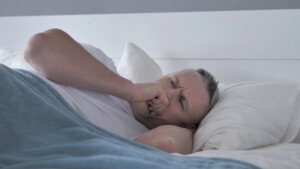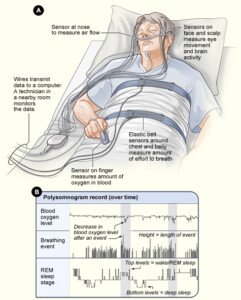
Sleep apnea may not always occur every single night and in fact may be sporadic in some cases.
This can be referred to as intermittent sleep apnea, in which the intermittency is measured in days or weeks rather than hours in a single night.
“There is night to night variability, positional variability and sleep stage variability of apnea,” says Dr. Nancy Foldvary-Schaefer, DO, MS, and Director, Sleep Disorders Center, Cleveland Clinic.
In order for sleep apnea to be sporadic or periodic, the circumstance that leads to it needs to be sporadic or periodic.
So for example, suppose a person’s obesity is the prime driver of apneic episodes every night.
The obesity is always there, every single minute of every night. Hence, if untreated, they experience sleep apnea every night, with likely no hour of absent apnea.

Shutterstock/Motortion Films
On the other hand, when obesity isn’t a factor, there can be variables that cause obstructive sleep apnea to occur periodically rather than nightly.
“Alcohol can worsen apnea too and cause night to night variability,” says Dr. Foldvary.
Drinking relaxes the throat structures, making them more susceptible to collapsing during slumber.
She adds that an upper airway infection, as well, can cause variability.
Lying on one’s back during sleep (supine position), especially if the head is minimally elevated, may for some individuals be a contributing factor to the intermittency, especially when other variables are present such as alcohol consumption.
Positional variability refers to sleep position.
Sleeping on one’s side is protective against the so-called positional sleep apnea.
Some people may find relief by sleeping in a recliner chair that’s angled closer to an upright position than in full recline.
Finally, food or seasonal allergies can inflame the upper airway, narrowing it.
Sleep Study: Lab More Accurate than Home
A sleep study in a lab and follow-up with a sleep medicine physician will determine what the triggers for the apnea are, and if indeed sleeping on one’s side is effective without CPAP or oral appliance treatment.

Sleep study
The caveat is that sleeping on one’s side for an entire night is difficult due to either eventual discomfort or reverting to a supine position without being aware.
Pillows can be arranged on the bed to prevent subconsciously rolling over to one’s back.
Sporadic sleep apnea is not necessarily asymptomatic.
Again, you should have a sleep study and thorough consultation with a physician whose specialties include sleep disordered breathing.

 Certified by the American Board of Neurology and Psychiatry in Neurology, Clinical Neurophysiology and Sleep Medicine,
Certified by the American Board of Neurology and Psychiatry in Neurology, Clinical Neurophysiology and Sleep Medicine, 






































